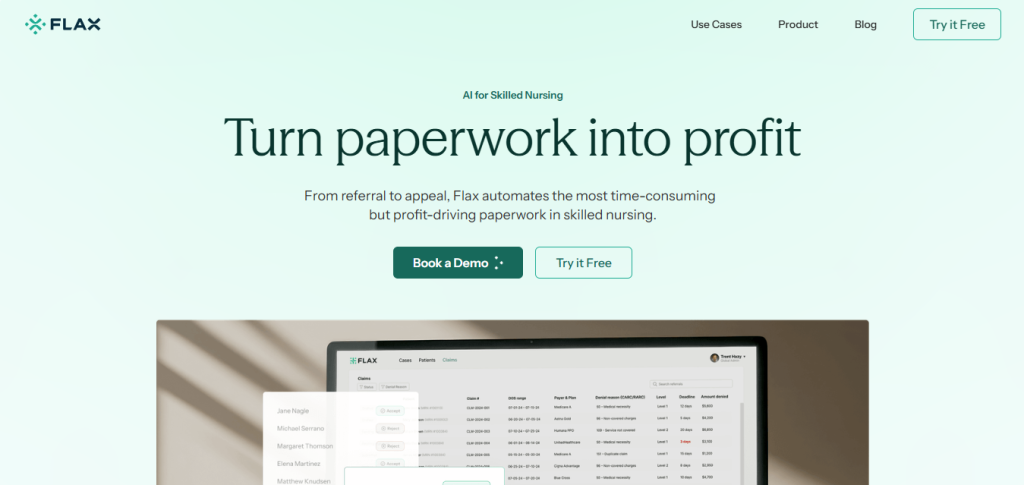Flax Health Raises $3.5 Million Pre-Seed to Transform Medical Paperwork Into Profit
September 18, 2025
byFenoms Startup Research

Flax Health, a new healthtech startup tackling one of the most overlooked but expensive problems in healthcare - paperwork - has raised $3.5 million in Pre-Seed funding. The round was led by Sorenson Capital and Pear VC, with participation from other early-stage investors.
Founded by Trent Hazy and David Kartchner, Flax Health is reimagining how health systems and providers manage claims, denials, and medical documentation - turning what was once a bottleneck into a source of profitability.
What Flax Health Does
The healthcare system is drowning in paperwork. From medical claims to reimbursement appeals, administrative processes eat up enormous amounts of time, energy, and money. According to the American Medical Association (AMA), physicians spend nearly 15 hours per week on paperwork and administrative tasks - time that could otherwise be spent caring for patients.
Flax Health offers an AI-powered solution designed to automate the most burdensome workflows in medical billing and documentation. The platform uses intelligent automation to process claims, manage denials, and optimize documentation, helping providers reclaim revenue lost to inefficiencies.
In simple terms, Flax Health’s mission is clear: to turn paperwork into profit.
Why This Funding Round Matters
Raising $3.5 million at the Pre-Seed stage reflects strong investor confidence in Flax Health’s model and market opportunity. The participation of firms like Sorenson Capital and Pear VC - both known for backing disruptive, category-defining startups - suggests that Flax Health is positioned to become a key player in the revenue cycle management (RCM) ecosystem.
The size of the problem is staggering. The Centers for Medicare & Medicaid Services (CMS) estimates that U.S. healthcare administrative costs exceed $266 billion annually, with claim denials alone costing providers over $20 billion per year. By automating workflows and reducing errors, Flax Health is attacking a pain point that healthcare organizations can no longer afford to ignore.
And this is where the real lesson for founders emerges. Flax Health didn’t go after the flashiest corner of healthtech like robotic surgery or consumer wearables - it went straight for the quiet inefficiencies nobody talks about but everybody pays for. That’s the ultra value drop: in trillion-dollar industries, the biggest opportunities are often hidden in the unglamorous tasks that drain resources every single day.
For founders, this is a sharp reminder that disruption doesn’t always mean inventing something brand new. Sometimes it means uncovering the invisible leaks in a system and designing a tool so effective that customers can’t imagine returning to the old way.
Why It Matters Now
The timing of Flax Health’s launch is critical. Healthcare systems are facing mounting financial pressure due to rising costs, workforce shortages, and post-pandemic operational strains. Administrative inefficiencies have become not just a nuisance but a threat to sustainability.
Research shows:
- McKinsey estimates that automation could save the U.S. healthcare system $150 billion annually by 2026.
- Becker’s Hospital Review reports that 90% of providers experience claim denials, and nearly 65% of those denials are never resubmitted.
- The Medical Group Management Association (MGMA) notes that revenue cycle inefficiencies reduce operating margins by 4–7% on average.
- CAQH Index 2023 found that administrative automation saved the healthcare system $187 billion, yet an additional $16.3 billion could still be captured annually through broader adoption.
In this environment, Flax Health isn’t just nice to have - it’s an essential lever for survival and growth.
Industry Outlook and Market Potential
Flax Health is operating in a sector with massive potential:
- Revenue Cycle Management (RCM): The global healthcare RCM market was valued at $140 billion in 2022 and is projected to reach $285 billion by 2030, growing at a 9.5% CAGR (Grand View Research).
- AI in Healthcare: According to Deloitte, 70% of healthcare executives plan to increase investments in AI and automation tools over the next three years.
- Digital Health Investment: Rock Health reports that U.S. digital health funding topped $15.3 billion in 2022, with RCM and operational efficiency tools among the most funded categories.
- Workforce Pressures: A survey by Kaufman Hall found that 90% of hospital executives cite workforce shortages as their top concern, making automation in administrative workflows a critical priority.
These numbers highlight why investors are betting on Flax Health. The company sits at the intersection of automation, cost savings, and healthcare sustainability - a sweet spot for growth in the coming decade.
What’s Next for Flax Health
With $3.5 million secured, Flax Health plans to accelerate product development, strengthen its AI capabilities, and expand its team. Early priorities include onboarding pilot customers, refining denial management algorithms, and building partnerships with health systems that are eager to test next-generation RCM tools.
The long-term vision is bold: to make Flax Health the go-to automation layer for healthcare paperwork, reducing administrative waste and ensuring providers capture the revenue they earn.
If successful, Flax Health could shift the narrative around healthcare innovation - proving that solving back-office inefficiencies can be just as transformative as advancements in clinical care.









